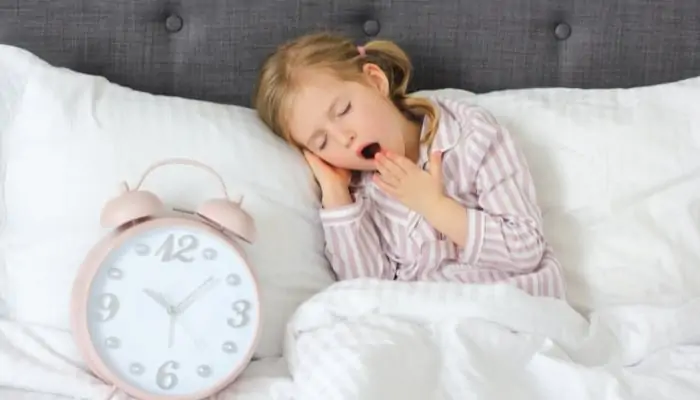What Age Should a Child Put Themselves to Bed?

This post may contain affiliate links. If you buy through the link, I may earn a commission. Learn More.
I am here to burst your bubble. There is no magic bullet when it comes to kids going to sleep on their own.
Each child has their own unique needs and timetable. What you can do is try to read your child’s signals, which will make bedtime much easier.
At What Age Should a Child Put Themselves to Sleep?
Your child will start going to bed by themselves sometime between 2 years old and 10 years old. This can vary significantly between each child and the family situation.
If possible do not push a child to go to bed on their own. Your child will start on this path when they are ready.
There’s No Set Age Kids Start Going to Bed On Their Own
“Should” is a dangerous word when it comes to parenting. We always wonder if our children are developing normally.
The moment we read the word “should” we start comparing our kids to all of those kids out there in the world who are mysteriously managing to reach milestones on the proper timeline.
The truth is there is no exact age for a child to go to bed on their own. However, there are ways to encourage a child to have more independence if you are ready for them to put themselves to sleep before they are.
Going to Bed vs Going to Sleep
Any insomniac can tell you that going to bed and going to sleep are not the same thing. A child might be eager to go to bed because they have a favorite toy in their room that is calling to them.
At about five years of age, my son started hiding books in his pillowcase that he would look at when he was supposed to be sleeping.
My husband and I gave our children a bedtime grace period. They got 30 minutes to themselves once they went to bed. After 30 minutes, my husband or I would check on them.
The rule at that point was they didn’t have to go to sleep, but they did have to stay in bed with the lights out. Usually, they fell asleep fairly soon after.
I stopped checking on my children around the time they started elementary school. They were tired after their long days, so the desire to stay up and play was less appealing to them than a full night of sleep.
However, on nights they did have difficulty sleeping, the same rule was enacted: 30 minutes of quiet time and then lights out.
Falling Asleep Naturally
Some say the key to getting children to put themselves to bed is to train them to fall asleep naturally.
From an age as young as four months, you can stop staying with your child until they are firmly asleep. Let them ease themselves on their own, and they will carry that with them through their lives.
Of course, that theory doesn’t always work in practice. My son fell asleep naturally and slept through the night, starting at three weeks old. I didn’t do anything to make it happen. It just happened.
I was confused about how parents could think that putting a child to sleep was so difficult until number two came along.
My daughter didn’t sleep at all for the first 18 months of her life unless someone was holding her. We consulted everything from physicians to Google to the Magic 8 Ball.
There was nothing physically wrong with her. We tried all of the ways to make a baby tired. We even tried the cry it out method. She cried out the whole family all night long.
One day she just started sleeping on her own. I would like to pretend it was something I did, but I think she was just really tired.
That’s my way of saying that you can and probably should try different ways to get a baby to fall asleep on their own.
One of them might work for you, but don’t be too worried that something is wrong if they don’t.
How Do You Know When Your Kid is Ready to Put Themselves to Bed?

Here are some bedtime readiness tips to keep in mind.
Your child will give you some hints they want to put themselves to sleep. For a lot of kids, the “hint” is more of a statement.
“You don’t need to tuck me in” or “I can do it myself” are good clues your child wants to manage the bedtime routine solo.
What if your child isn’t ready to go to bed alone yet, but you feel they should? One way to encourage independence is to change up the routine.
If you usually read a book to your child as they’re snuggled in bed, move the book out of the bedroom. Read in a family room or, perhaps better, have your child read to you.
Another option is a post-sleep promise. Say goodnight with a hug and a kiss, and then tell your child you will check in on them in an hour to make sure they’re sleeping well.
Your child will feel safe and secure while also gaining their own independence.
You might encourage your children to sleep on their own by making the environment more conducive to sleep.
My 15 year old son still uses this Darth Vader night light. My daughter uses a star projector to lull her to sleep.
They both have glow in the dark star stickers on their ceilings. In addition, we ensure they have comfortable pillows and soft sheets.
- Upgraded 4-in-1 Galaxy Projector Night Light – This galaxy projector for bedroom combines an aurora…
- Sound Activated & Built-in Music Speaker – Our star projector boasts a cool feature that enables you…
- White Noise Sound Machine – The night lights for kids room come pre-installed with 8 different white…
Seek Out the Help of a Professional
Children don’t necessarily need to be a certain age to start putting themselves to bed. There will be a time when they no longer need help, but that will vary from child to child.
What do you think? Tell us your thoughts in the comments.

